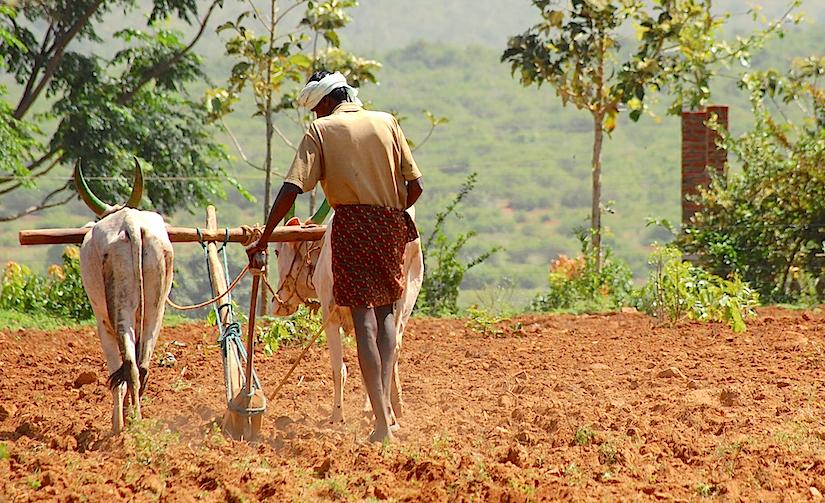Farm Export Policy Poses Threat to Small farmers, Food Security

Amid deep agricultural distress, the Narendra Modi government is going all out to give a final blow to the Indian farmers under the garb of its liberal farm export policy.
Currently, the government is intensifying its efforts to project the anti-farmer move as an endeavour that is likely to boost farmers’ incomes by 2022. The attempts of selling off agriculture produce to big corporates are underway, in utmost secrecy. The new agriculture policy, which had been in talks since the past one year, is currently under inter-ministerial consultation after having received the go-ahead from the Prime Minister’s Office, and is likely to be placed before the Union Cabinet soon for approval.
Discussing the soon-to-be-cemented policy, Commerce and Industry Minister Suresh Prabhu on Thursday said, “Government will soon set up specific agriculture export zones well-placed with ports and airports in the country, aimed at boosting India’s agriculture products exports internationally.”
The false projections by the government are clearly exposed if one explores the sentiment on the ground. “Sarkar kisanon ko hi kheti se bahar nikalne ki baat karahi hai. Ye policy farmers ko sadkon pe leaayegi (The government is trying to oust farmers from the farming itself. This policy will leave farmers down and out)," says an enraged Jaswinder Singh of the All India Kisan Sabha (AIKS) – currently campaigning on the ground to spread awareness about the pro-corporate export policy.
Singh added, “If one were to understand the composition of Indian agriculture, it becomes clear that major space is taken by smaller, marginalised farmers and peasants. In this context, the export zones run the risk of completely displacing them.”
Also read: Bumper Harvest, Yet 20 Crore Indians Go Hungry
The policy will be easing rules for over 50 export-oriented farm clusters identified by the Ministry of Agriculture and the Agricultural and Processed Food Products Export Development Authority (APEDA). The hasty initiation of the process is being viewed as an ill thought out move by the government to make the export zones accessible to bigger corporates, completely crushing the peasantry that constitutes the backbone of Indian agriculture.
The aggressive attack of the Modi government in the form of the farmer export policy also means insecurities over food security. The liberal policy push will require the government to fix permanent threshold quantities of farm commodities that will be free from any kind of trade restrictions. If implemented, this will be a critical shift away from past policies because the country will have to keep a certain level of farm exports going even when the supplies are low – even during a drought. India, in the past, had curbed farm exports to ensure that the domestic prices were in check. The new policy will make a departure from this approach. To make agriculture export-oriented would mean major compromises to the nation’s food security, which could trigger the beginning of a food crisis in India. After 2014, the agriculture export of the country has declined by 22 per cent. In such a scenario, trade restrictions have been deemed imperative to save the domestic markets. For a country largely dependent on agriculture, India’s share in global agriculture remains an abysmal 2 per cent only. Lifting export restrictions is therefore only in the interest of the corporates, and not the farmers, as once the market is flooded with agricultural import, the domestic farmers are likely to suffer losses by not receiving proper prices for their produce. In the name of reportedly doubling farmers’ income, the government will end up decreasing them, deepening the impact of the ongoing agrarian distress.
Also read: PMO Gives Go-ahead to Anti-Farmer Agriculture Export Policy
Newsclick had previously reported how the export policy will render the farmers as nothing more than mere pawns in the government’s liberalisation project. The farmers will not be given benefits, as the export policy is likely to free up most commodities other than staples from the export bans, which will lead to deregulation of processed and organic food.
Speaking at the inauguration of Biofach India – the world’s largest event on organic industry organised by APEDA and Indo-German Chamber of Commerce – Prabhu made the agenda of tapping on the organic food market clear, benefits of which will be reaped by the industry, as farmers are kept in the dark about the forthcoming drastic changes.
The long-term implications of the policy pose a threat not just to the food security of the country, but also to the environment. Speaking to Newsclick, Dr Sunilam, activist and former Samajwadi party MLA, said, “There will be adverse effects on the nature and soil composition which will further burden the farmers.”
The government’s reductionist approach to the policy exposes the blatant extent of the sidelining of farmer’s interests to benefit a select few. The miscalculations of the Modi government have failed to take into account the fundamental problems with the MSP evaluations, and the falling domestic prices for produce. Additionally, many rival global producers have complained about Indian state support, and falling global farm product prices that undermine export prospects.
Get the latest reports & analysis with people's perspective on Protests, movements & deep analytical videos, discussions of the current affairs in your Telegram app. Subscribe to NewsClick's Telegram channel & get Real-Time updates on stories, as they get published on our website.























